- Home
- Warhammer 40K
Konrad Curze the Night Haunter - Guy Haley Page 2
Konrad Curze the Night Haunter - Guy Haley Read online
Page 2
TWO
PAY DIRT
Death heralds itself in the most innocuous way, Elver thought later, in those long years on the way to Tsagualsa. Often he didn’t have anything to think about, except death. He supposed he didn’t have much choice. The single most momentous day was the day death came for him, and it hung around his neck for the rest of his life. It came not with fanfare or dread anticipation, but announced itself with the soft, pulsing chime of an active auspex return.
The noise filled him with dread. He never knew how his forebodings worked, but they did, hinting at awful things about to happen. Never with enough clarity to be actually useful, only enough to have him dwell in a state of fear. He knew the return was bad, right from the start.
The reaction of the rest of the crew of the Sheldroon was at odds with Elver’s frown. Unlike him, they were excited. Not long after that they were all dead, so who was right on that score, eh?
‘Auspex return!’ yelled the Sheldroon’s Master of Divination, Tolly Kiner. Tolly, like the rest of the crew, had a fancy title, though he lacked the training or certification to back it up. Because he was better than the rest of them at operating the Sheldroon’s minimal sensorium, Master of Divination he was.
‘What?’ Captain Overton craned his neck around, peering over the back of his grubby throne. The gleam of the seat’s greasy metal was matched by the avaricious spark in Overton’s eyes. ‘What are you talking about?’ He was a gruff man with unpalatable appetites and a hard temper. Kind words very rarely escaped his fat lips.
You’ve heard alright, thought Elver. I can see it. I can see it in your ugly face. You smell money.
‘Auspex return, Master Overton,’ repeated Tolly Kiner excitedly. He pressed his face against the rubber collar that shielded the feeble glow of his monitor from the bridge’s lumens. ‘Pay dirt! It’s a good read, metal. There’s an active power source. She’s on a steady course, sir, ripe for plucking!’ He looked up from the viewing collar. His eyes were wide with greed, like two moist opals embedded in soil. ‘Pay dirt!’ he repeated. Kiner had been a void miner once. He used their terms, and remained as stubbornly filthy as every asteroid-grinder Elver had ever met.
‘Let me see,’ said Overton, hauling himself out of his throne and pushing his way through the bridge back to the sensorium station. The Sheldroon’s bridge was cramped and smelly, much like the rest of her, and far too confined to adequately accommodate Overton’s gut. He barged past other men at their stations. Overton was too miserly to pay for servitors to run the ship. He said whole, living men were cheaper, which they were. The bridge’s overcrowded, foetid conditions were the direct result. The place stank of bad breath, unwashed arses and farts. Many of the ship’s main cogitation systems were housed under the bridge deck to save space for cargo, and their workings made the room so hot the crew worked stripped to the waist, the top parts of their coveralls soaking up the sweat that ran freely from their bodies. They were all men. Overton despised women.
Elver had been bond-traded by his family to Overton’s ship on a twelve year prentice’s contract. He was supposed to meet up with his own people in four more years, by which time he was supposed to be a fully trained helmsman; at least that was the idea. Overton had him manning the attitudinal thrusters ninety per cent of the time, a job a man with half a brain could do, and on most ships did. The Sheldroon’s helmsman, Gravek, guarded his chair more fiercely than an eagle did her chicks. If Elver ever got home, he’d be no use to anyone. He was no longer glum about that, it was just a fact.
He shuddered as Overton’s fat, soft belly pressed against him, enveloping him from elbow to backside in unwanted, intimate warmth. The captain patted him far more times than necessary. Such attention from Overton often preceded sadistic beatings, and worse. Elver tensed, but the captain had minimal interest in him at that moment. Overton was bent on viewing the potential treasure, and moved past him quickly. It took Elver half a minute to relax, nevertheless.
The auspex continued its seductive chiming as Overton shoved his way to the angled console. Tolly Kiner relinquished his station with a clumsy dancer’s step, keying on the machine’s vocaliser as he did so. The auspex began to sing data in time with its pulsing chime, accompanying its monotonous tune with flat-voiced lyrics of chemical composition and molecular density.
‘It’s right there, captain, right there on the screen. Take a look. Take a look!’ Tolly Kiner rubbed oil-seamed hands together. ‘Pay dirt, I tell you. Pay dirt!’
‘Alright, alright!’ grumbled Overton, but he couldn’t quite hide his excitement. ‘Let’s see what we have.’
He pressed his eyes to the viewing collar. Green light leaked out around the sides, staining the wrinkles on his face livid.
‘Is it good, captain?’ Gravek called back down the narrow bridge. He was the one who’d have to do all the work if it was. Catching junk in open space wasn’t easy.
‘It’s metal, that’s for sure. Kiner here’s right about the power source too, it’s ringing nice and clear. Yeah…’ His voice trailed off as he digested what the vid screen was telling him.
‘I don’t like it. I think we should leave it there,’ said Elver.
Overton looked at him. ‘What?’ he scoffed. ‘It could be something. Could be anything.’ He shrugged. Once again, his attempts at dissembling didn’t work. He thought it was something, and valuable.
Elver didn’t like Overton’s tone. He didn’t like Overton at all.
‘Yeah,’ Elver said. ‘It could be anything. It could be bad.’
Overton peered back into the auspex scope. He pressed his face harder into the rubber to block out the light, causing his fat cheeks to overspill the edge.
‘Ah, you don’t know nothing,’ grumbled Overton. He shared this view of Elver often. ‘You youngbloods come on board, think you know it all. You don’t get to be chartist captain of a vessel this fine by being cautious.’
Elver didn’t think the Sheldroon fine at all. He thought it was junker, which it most assuredly was. Half a million tonnes of sub-light, rusting, plodding freighter, trekking back and forth on a five year loop between two miserable systems galactic luck put in close proximity to one another, but granted no further advantages than that. If someone had spun him around until he was dizzy and put him down on either Diamante or Xen V, Elver wouldn’t have been able to tell where he was. The terminus worlds were as grim and grimy as each other.
Overton’s mind was already made up. For reasons of appearing thoughtful and wise, he made the pretence of thinking their course through, when they could all tell they’d be chasing the blasted thing down already.
‘There’ll be tech, archeotech maybe, and worth a small fortune. There’s a lot of gear still floating around after the war. Lots of it.’ Overton was greedy, and he never stopped talking about the damned war, though it was done while Elver was a baby. Ancient history. The Warmaster was defeated. In his more bitter moments Elver suspected it wouldn’t have mattered a jot to the likes of him if Horus had dethroned the Emperor. He was born into a miserable voider’s life and would stay there no matter who was the galaxy’s master.
Overton snorted loudly, hawked up a wad of phlegm and spat it onto the deck. It fell through the grating and hissed on the overheated machinery beneath. ‘Gravek! Cut speed, bring us into a parallel course with the salvage before it’s lost to the void.’
‘It’d better be a good find,’ moaned Gravek. ‘It don’t look like much, this little curve,’ he tapped the course correction graphic on his scratched display. ‘But it’ll cost us in fuel and time. It’ll take a week to get back up to our current velocity, more if we have to drop below half light.’ His objections were ritualistic, not genuine. He was already slamming levers and depressing buttons. The timbre of the ship’s tired old voice changed. Harsh vibrations quivered its void frame as its main manoeuvring jets burst into activity.
Slowing down was time consuming, risky and uncomfortable to the crew, but that was the easy p
art. Catching the object was where the challenge lay, and when the Sheldroon finally had a sympathetic trajectory, still they wasted two full days bringing the salvage aboard.
Elver hurried from the bridge to the catch-bay as soon as the notification echoed down the Sheldroon’s leaky corridors. He had been hoping for a piece of worthless junk; though that would have plunged Overton into a foul mood that they’d all suffer for, junk couldn’t hurt anybody. Excited shouts squeaking over the vox-net from the catch-bay told him otherwise. Air was still rushing back into the space, so he hurried on his rebreather and tanks in a state of mild terror. When he walked into the crowded bay and saw the salvage, he knew he was right to be afraid.
The smell of the open void worked its way around the imperfect seal of his respirator mask. Some people described the scent as spicy. Dusty, others said. However they perceived the smell, most people seemed to like it; Elver didn’t. He thought it was awful, though he’d been born with it in his nostrils. He struggled to describe it. To him it was burning metal, or ionised air scorched by las-beams. Either way, it wasn’t pleasant; a chemical stink so harsh and dry it scraped at the inside of your nose until the membranes crackled. Once it got past the nasal cavities, it clawed at the throat. It made him sneeze. It made his eyes water and his nose run. For hours after being in the airlocks or the catch-bay or anywhere else the crew had let the air out and the void in, he was choking on mucus.
At that precise moment, he wasn’t worried too much about mucus.
The salvage was gripped by the Sheldroon’s extendible salvage claw. The claw ran on ceiling mounted rails that went all the way down the catch-bay’s external access tunnel to the single-skin airlock dividing the ship’s interior from space. Lumens glared sodium light down the tunnel, lighting the prize in shades of orange as it clanked its way within.
He’d seen sarcophagi a couple of times. Once, his mother’s ship had carried a cargo of methalon-suspended specialists to some nowhere outpost. Another time, he’d passed quietly through tombs full of stone coffins made for things lacking human proportions. That was back on Galenar, well over a century ago in objective years. His mother thought he should see a world with plants and a kind sun shining in the sky once. It had only been the once, too. She would never dream of paying for the experience twice.
This salvage, well, that looked like the methalon caskets and the alien sarcophagi: a mummy’s case set loose to drift stellar currents, pulled up from stellar chasms by the Sheldroon. It was immense, far too big for a human being. Just standing near it sent his secret talent wild with terror, and he didn’t need his gift to tell him it was the height of idiocy bringing the salvage aboard. It radiated wickedness.
The catch-bay wasn’t very big; no larger than a hangar for a small lighter. The single skin airlock was small, and not equipped with atmospheric shielding. When the door was open, the catch-bay had to be empty. Operations were controlled from a cramped gallery behind a curved window of age-bloomed plastek. Centuries of patching and jury-rigging had robbed the bay of space and utility. In that respect it was like every other part of the Sheldroon.
Bringing anything aboard was time consuming and that cost money, so they mostly didn’t use the catch-bay for catching anything, but instead employed it as an ad hoc store, keeping things there that had nowhere else to live. Salvage for the Sheldroon was an opportunistic sideline. Sheldroon was a blind old thing, its sensorium weak, not intended to find motes of wealth in the grand sweep of the void. The ship’s elderly machine-spirit spent its time peering ahead for danger. The mag-prow pushed aside most particulate debris, but anything bigger than half a tonne posed a threat, no joke at near-light speed.
Salvage was a game of chance played on system fringes, not out there in the deeps of the interstellar void. Usually whatever they found was too big to take with them, and nearly always moving far too fast to intercept. If they found a hulk or debris field they would mark its location and sell on the data. Talk of missed glories was the crew’s favourite pastime. Teach especially liked to maunder on about the paydays they’d glimpsed but could not catch. Much of it was misty-eyed nonsense. When they brought something aboard it was always some heap of scrap they’d be lucky to get a few double eagles for, and most of that went to Overton.
Not this time. It was obvious right away that this device was valuable. The surface was pitted with debris impacts, but otherwise looked relatively new. A few dull indicator lumens glowed in a deep, lateral channel where elements of machinery were visible. Whatever it was, it was working. It was human built, as far as he could tell, and humming with high technologies. It was smooth, making the rusty, hazard-striped claw that held it seem crude. The whole catch-bay looked shabbier with the salvage in it.
All the passengers and all the crew were there, more or less; only Gravek was absent, jealously guarding his position against any who might usurp him, meaning Elver.
That meant twenty-three crew and four passengers crammed into the bay. The passengers were of a class monied enough to leave their home world, but insufficiently rich to afford a berth on a warp-capable vessel. Three of them, a family party, were as excited as the crew. The fourth – some sort of minor official, Elver thought – travelled alone. He stood aside, his bland, forgettable face concerned.
Elver understood why the man looked that way. Dread filled the pit of his own stomach like molten lead.
‘We’re going to be rich!’ shouted someone. Teach, Elver thought. It was hard to tell with them all speaking through their rebreathers. The attached voxmitters were of laughable quality, and made everyone sound like malfunctioning servitors.
Elver hung back by the door. Half the crew were down on the bay’s lading floor, ringing the central space where they would let the pod down. The rest stood on the companionway raised around the sides of the room, where it wasn’t crammed with yet more haulage. There was an amount of vox-blurred whooping and cheering. The minimal share Overton would allow the crew would be more money than they’d otherwise make in a lifetime.
If they survived to collect it, thought Elver. He lived in an age of cynics, and he was a purebred example to his pessimistic bones.
‘Bring it in! Bring it in!’ Overton’s vox-garbled voice cut through the ever-escalating tally of salvage payments the crew bandied between each other. These had long since left the realm of feasibility behind, growing larger with each enthusiastic recalculation. A green button was pressed upon a simple control podium. A klaxon grated. Lights spun, and the claw squealed the last few metres down the access way into the catch-bay.
The sarcophagus slipped from the worn grips of the arm as it turned to set it down at the centre of the chamber. The bottom hit the deck, then the whole thing toppled over with a resounding boom, scattering the crowd. For a second there was silence, until a man named Colan Barkar shouted in nervous relief.
‘That drakking thing nearly landed on my foot!’
The men brayed with laughter. Elver felt dizzy. His pulse pounded at his temples. His mouth was dry and sour with the acid of his churning gut.
These feelings were never wrong.
The men gesticulated at one another, their shouts layering over each other’s so that no one voice could be heard.
The pod was chilled from the void cold enough to kill. Atmospheric frost furred it in sheets that grew thick and shaggy before Elver’s eyes.
‘Alright, alright, curb your cheer!’ roared Overton. The jubilant crew refused to be cowed, but the men quieted a little, stepping back to let the quartermaster Dendren Mankor through. Mankor was a worlder born – not like the rest, who were void scum to a man – and had more authority than any of them excepting Overton. He carried a data-slate in an industrial casing, which he proceeded to wave over the sarcophagus. As the sensor snout sucked in information and painted it upon the cracked screen, Mankor’s growing astonishment was plain for all to see through his visor. One by one the men fell silent.
‘I’m reading a grade fifteen compact plas
ma reactor,’ he said. ‘A whole bunch of active circuits… Non-organic cogitation units. It’s all working, by the Throne! And, a, and…’ he held the screen up to Overton’s face. ‘Is that what I think it is?’
Overton pulled his rebreather off over his head, leaving it to hang down his back by the straps. He leaned in to the data-slate and read. Gold flashed in his mouth as a smile split his face.
‘By the void, man, it is!’ He grabbed Mankor’s hand and held it up. The slate shed weak light over the crowd. ‘A functioning stasis field!’
‘We’ve lucked out this time! By Terra’s dusty old bones, we’ve lucked out!’ Tolly Kiner whooped, doffed the filthy cap he was wearing and slapped his shoes with it, one after the other, as he danced an uncoordinated jig. ‘Pay dirt!’
‘Hang on.’ Mankor pulled his arm back down. He frowned at the screen. ‘There’s something in the field,’ he said.
‘Platinum?’ said someone hopefully.
‘A passenger?’
‘Riches!’ yelled another.
Mankor gave them a withering look. ‘It’s a stasis field. How can I read what it is inside it? It’s impossible. Time’s stopped in there.’
‘Does mean you can’t look in as well?’ said someone. ‘I mean, the light can’t get out, can it?’
Sniggers went around the room.
‘Don’t be stupid!’ Overton rebuked the man, then to the rest, ‘What do you expect from void scum? Of course you can see.’ The crew roared with laughter. Normally they’d sulk and scowl at his rebukes, but their spirits were high. ‘There should be a viewing plate. Let’s have a look.’
Overton pulled on a thick glove and scraped ice crystals from the window set in the front of the pod. They reformed as soon as he wiped them away. The others leaned in, shoving to get a look through the limited space. Elver found himself being drawn forwards against his will, but he could not stop his feet from carrying him towards the hunched backs of the others, who scraped and scraped like they were digging into the sand for lost coins.

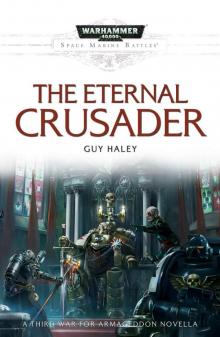 The Eternal Crusader - Guy Haley
The Eternal Crusader - Guy Haley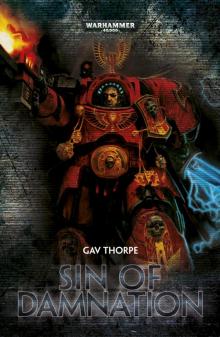 Sin of Damnation - Gav Thorpe
Sin of Damnation - Gav Thorpe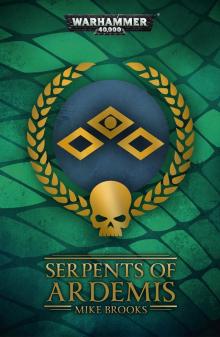 Serpents of Ardemis - Mike Brooks
Serpents of Ardemis - Mike Brooks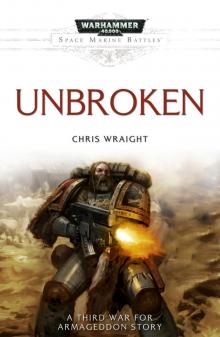 Unbroken - Chris Wraight
Unbroken - Chris Wraight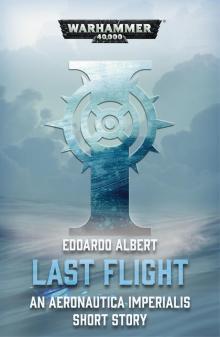 Last Flight - Edoardo Albert
Last Flight - Edoardo Albert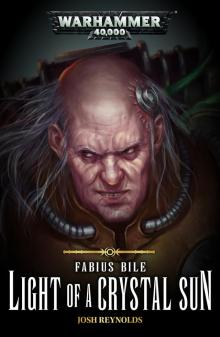 Light of a Crystal Sun - Josh Reynolds
Light of a Crystal Sun - Josh Reynolds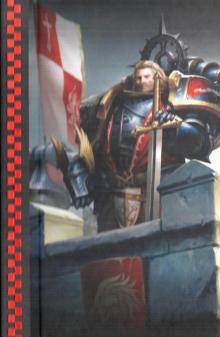 Lion El'Jonson- Lord of the First - David Guymer
Lion El'Jonson- Lord of the First - David Guymer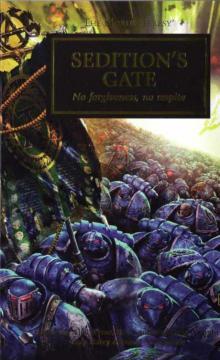 Sedition's Gate - Nick Kyme & Chris Wraight
Sedition's Gate - Nick Kyme & Chris Wraight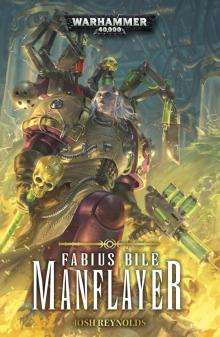 Manflayer - Josh Reynolds
Manflayer - Josh Reynolds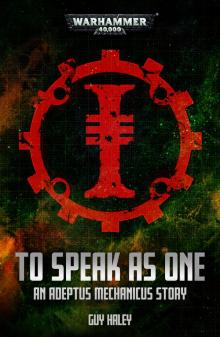 To Speak as One - Guy Haley
To Speak as One - Guy Haley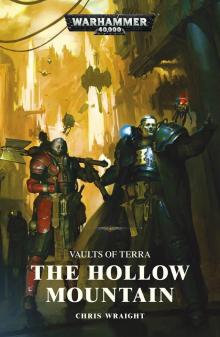 Vaults of Terra- The Hollow Mountain - Chris Wraight
Vaults of Terra- The Hollow Mountain - Chris Wraight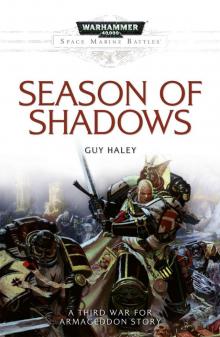 Season of Shadows - Guy Haley
Season of Shadows - Guy Haley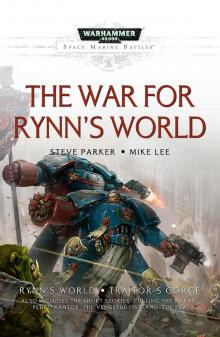 The War for Rynn's World - Steve Parker & Mike Lee
The War for Rynn's World - Steve Parker & Mike Lee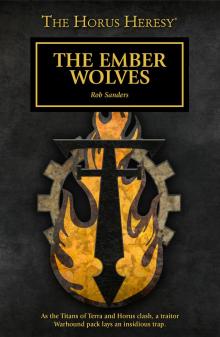 The Ember Wolves - Rob Sanders
The Ember Wolves - Rob Sanders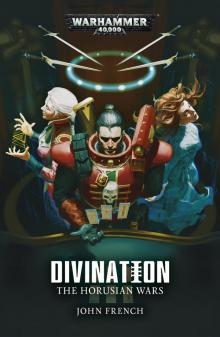 Divination - John French
Divination - John French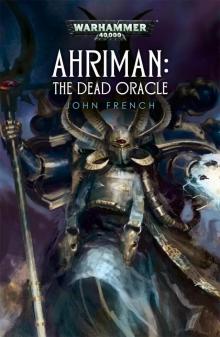 The Dead Oracle - John French
The Dead Oracle - John French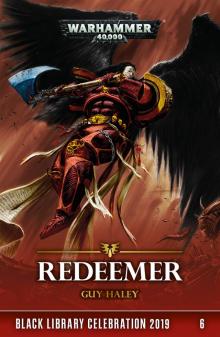 Redeemer - Guy Haley
Redeemer - Guy Haley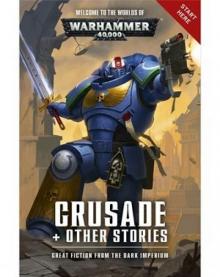 Crusade & Other Stories - Dan Abnett Et Al.
Crusade & Other Stories - Dan Abnett Et Al.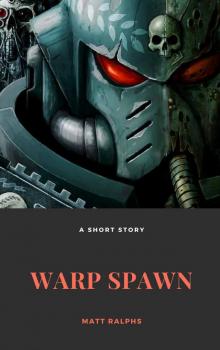 Warp Spawn - Matt Ralphs
Warp Spawn - Matt Ralphs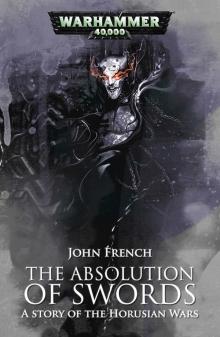 The Absolution of Swords - John French
The Absolution of Swords - John French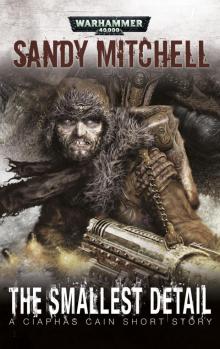 The Smallest Detail - Sandy Mitchell
The Smallest Detail - Sandy Mitchell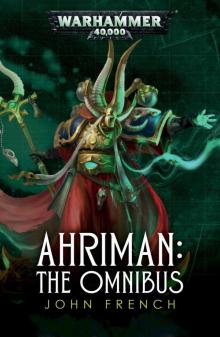 The Omnibus - John French
The Omnibus - John French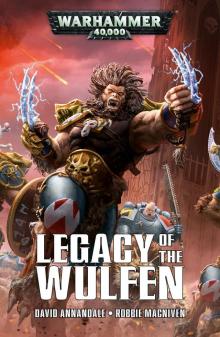 Legacy of the Wulfen - David Annandale & Robbie MacNiven
Legacy of the Wulfen - David Annandale & Robbie MacNiven A Memory of Tharsis - Josh Reynolds
A Memory of Tharsis - Josh Reynolds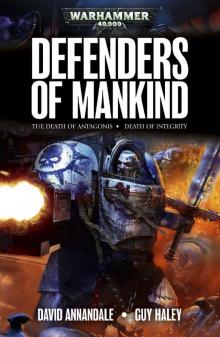 Defenders of Mankind - David Annandale & Guy Haley
Defenders of Mankind - David Annandale & Guy Haley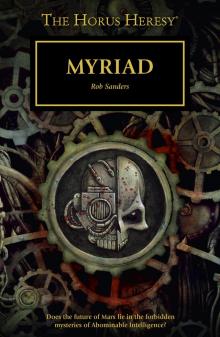 Myriad - Rob Sanders
Myriad - Rob Sanders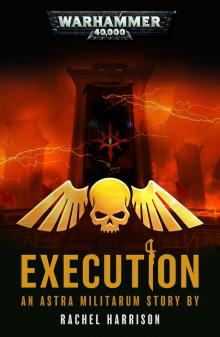 Execution - Rachel Harrison
Execution - Rachel Harrison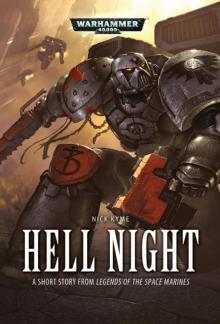 Hell Night - Nick Kyme
Hell Night - Nick Kyme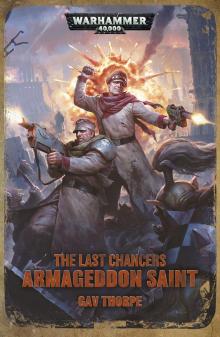 Armageddon Saint - Gav Thorpe
Armageddon Saint - Gav Thorpe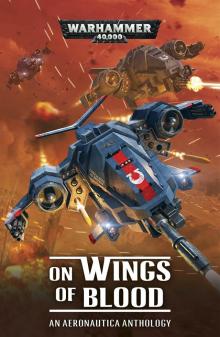 On Wings of Blood
On Wings of Blood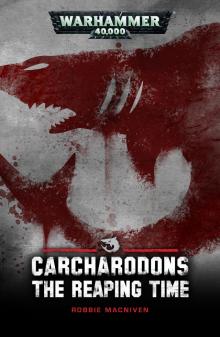 The Reaping Time - Robbie MacNiven
The Reaping Time - Robbie MacNiven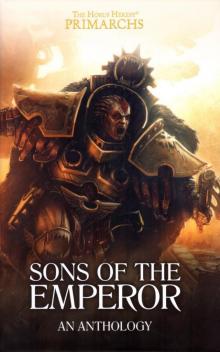 Sons of the Emperor
Sons of the Emperor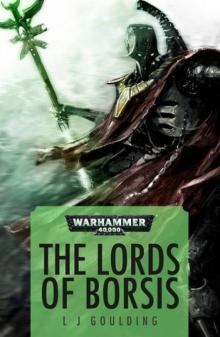 The Lords of Borsis - L J Goulding
The Lords of Borsis - L J Goulding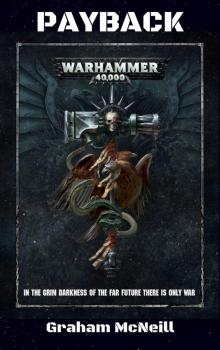 Payback - Graham McNeill
Payback - Graham McNeill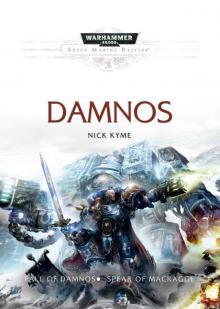 Damnos - Nick Kyme
Damnos - Nick Kyme The Last Son of Prospero - Chris Wraight
The Last Son of Prospero - Chris Wraight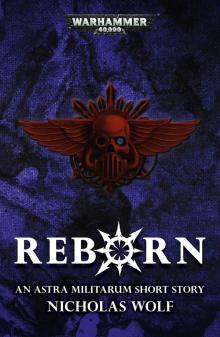 Reborn - Nicholas Wolf
Reborn - Nicholas Wolf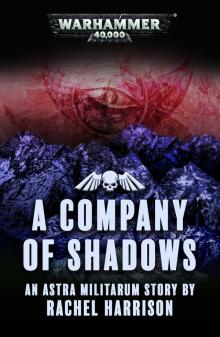 A Company of Shadows - Rachel Harrison
A Company of Shadows - Rachel Harrison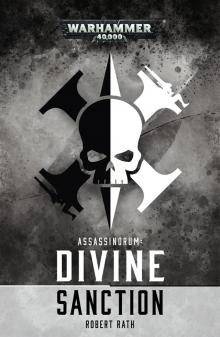 Assassinorum- Divine Sanction - Robert Rath
Assassinorum- Divine Sanction - Robert Rath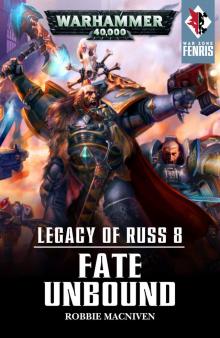 Fate Unbound - Robbie MacNiven
Fate Unbound - Robbie MacNiven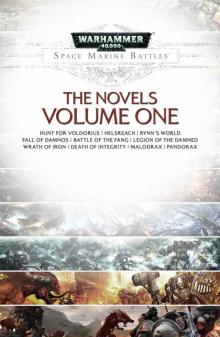 Space Marine Battles - the Novels Volume 1
Space Marine Battles - the Novels Volume 1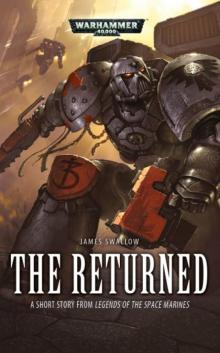 The Returned - James Swallow
The Returned - James Swallow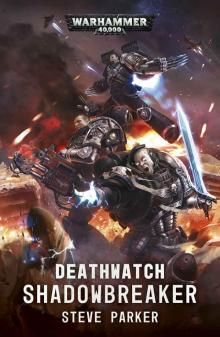 Shadowbreaker - Steve Parker
Shadowbreaker - Steve Parker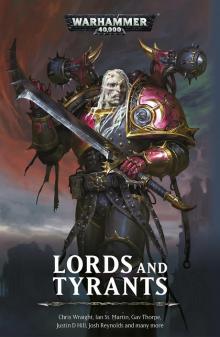 Lords and Tyrants
Lords and Tyrants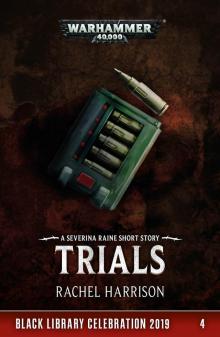 Trials - Rachel Harrison
Trials - Rachel Harrison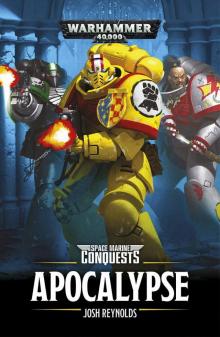 Apocalypse - Josh Reynolds
Apocalypse - Josh Reynolds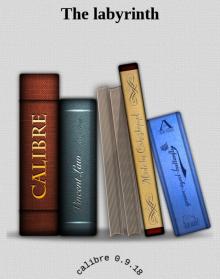 The labyrinth - Richard Ford
The labyrinth - Richard Ford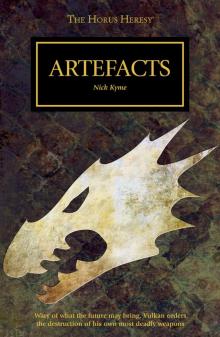 Artefacts - Nick Kyme
Artefacts - Nick Kyme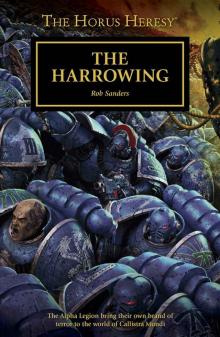 The Harrowing - Rob Sanders
The Harrowing - Rob Sanders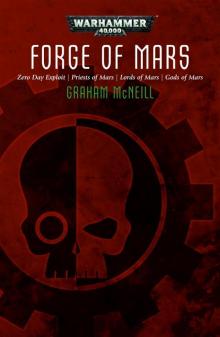 Forge of Mars - Graham McNeill
Forge of Mars - Graham McNeill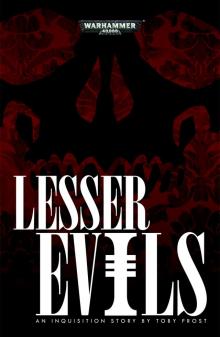 Lesser Evils - Toby Frost
Lesser Evils - Toby Frost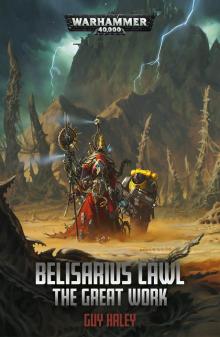 Belisarius Cawl- the Great Work - Guy Haley
Belisarius Cawl- the Great Work - Guy Haley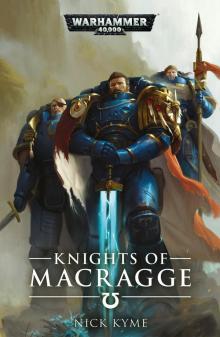 Knights of Macragge - Nick Kyme
Knights of Macragge - Nick Kyme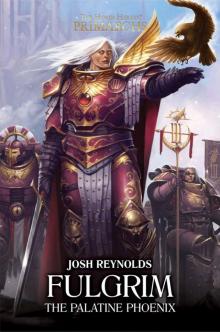 Fulgrim- The Palatine Phoenix - Josh Reynolds
Fulgrim- The Palatine Phoenix - Josh Reynolds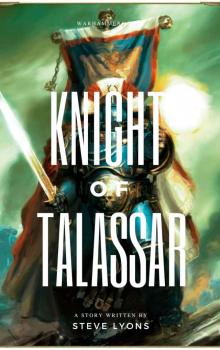 Knight of Talassar - Steve Lyons
Knight of Talassar - Steve Lyons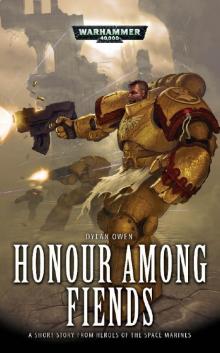 Honour Among Fiends - Dylan Owen
Honour Among Fiends - Dylan Owen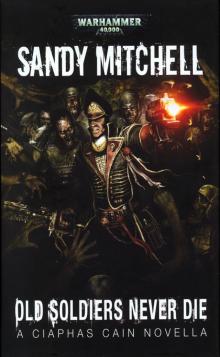 Old Soldiers Never Die - Sandy Mitchell
Old Soldiers Never Die - Sandy Mitchell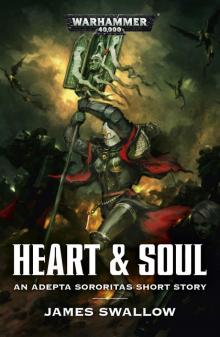 Heart & Soul - James Swallow
Heart & Soul - James Swallow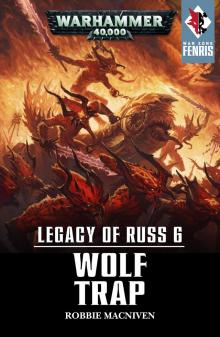 Wolf Trap - Robbie MacNiven
Wolf Trap - Robbie MacNiven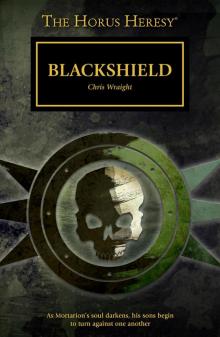 Blackshield - Chris Wraight
Blackshield - Chris Wraight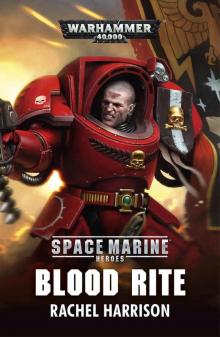 Blood Rite - Rachel Harrison
Blood Rite - Rachel Harrison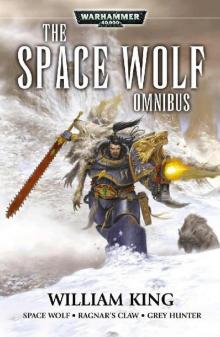 The Space Wolf Omnibus - William King
The Space Wolf Omnibus - William King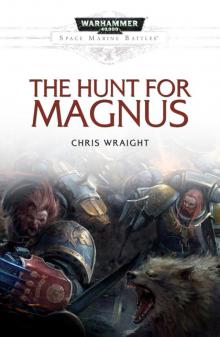 The Hunt for Magnus - Chris Wraight
The Hunt for Magnus - Chris Wraight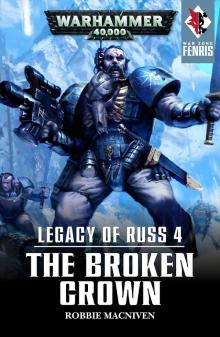 The Broken Crown - Robbie MacNiven
The Broken Crown - Robbie MacNiven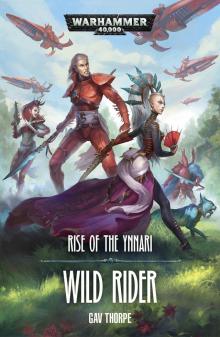 Wild Rider - Gav Thorpe
Wild Rider - Gav Thorpe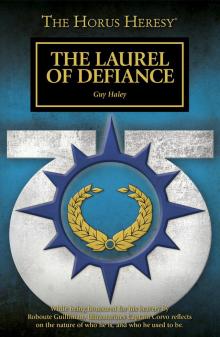 The Laurel of Defiance - Guy Haley
The Laurel of Defiance - Guy Haley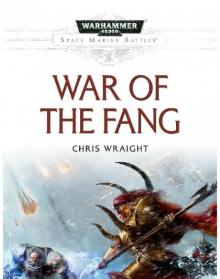 War of the Fang - Chris Wraight
War of the Fang - Chris Wraight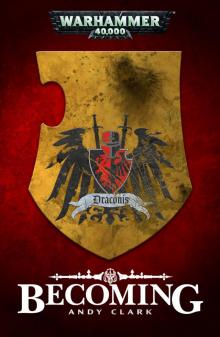 Becoming - Andy Clark
Becoming - Andy Clark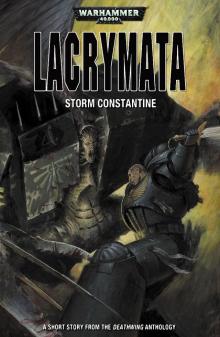 Lacrymata - Storm Constantine
Lacrymata - Storm Constantine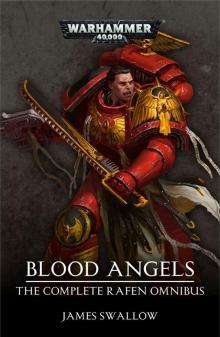 Blood Angels - The Complete Rafen Omnibus - James Swallow
Blood Angels - The Complete Rafen Omnibus - James Swallow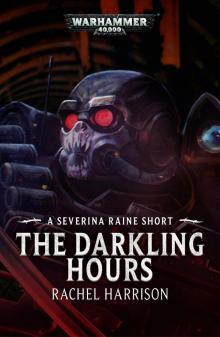 The Darkling Hours - Rachel Harrison
The Darkling Hours - Rachel Harrison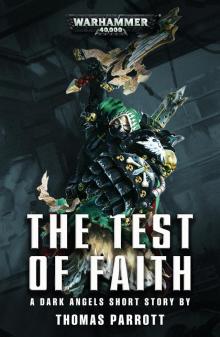 The Test of Faith - Thomas Parrott
The Test of Faith - Thomas Parrott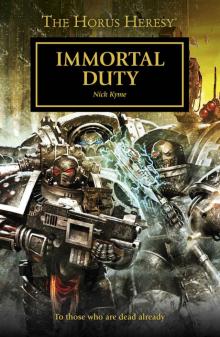 Immortal Duty - Nick Kyme
Immortal Duty - Nick Kyme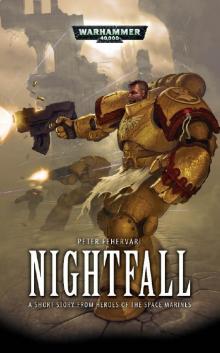 Nightfall - Peter Fehervari
Nightfall - Peter Fehervari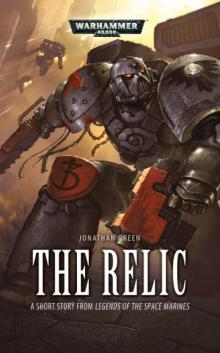 The Relic - Jonathan Green
The Relic - Jonathan Green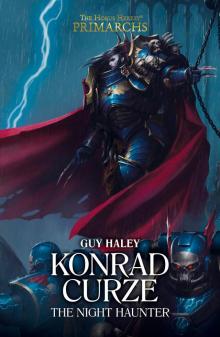 Konrad Curze the Night Haunter - Guy Haley
Konrad Curze the Night Haunter - Guy Haley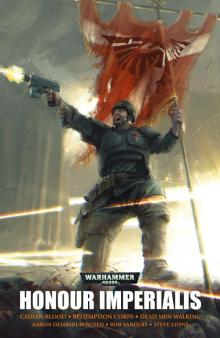 Honour Imperialis - Aaron Dembski-Bowden
Honour Imperialis - Aaron Dembski-Bowden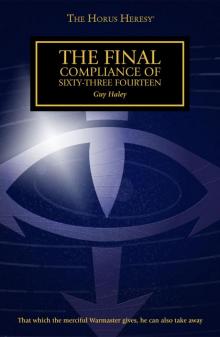 The Final Compliance of Sixty-Three Fourteen - Guy Haley
The Final Compliance of Sixty-Three Fourteen - Guy Haley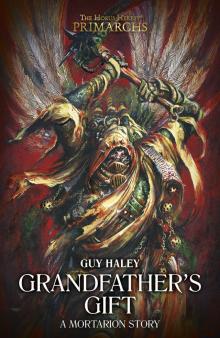 Grandfather’s Gift - Guy Haley
Grandfather’s Gift - Guy Haley Twisted - Guy Haley
Twisted - Guy Haley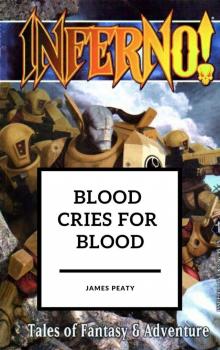 Blood Cries for Blood - James Peaty
Blood Cries for Blood - James Peaty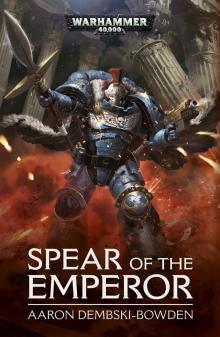 Spear of the Emperor - Aaron Dembski-Bowden
Spear of the Emperor - Aaron Dembski-Bowden All That Remains - James Swallow
All That Remains - James Swallow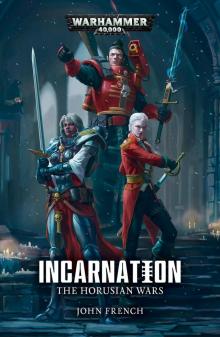 Incarnation - John French
Incarnation - John French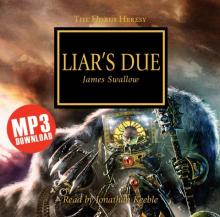 Liar's Due - Ben Swallow
Liar's Due - Ben Swallow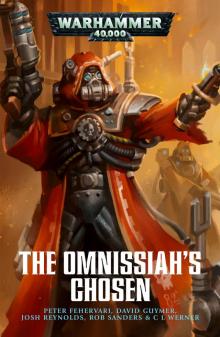 The Omnissiah's Chosen - Peter Fehervari
The Omnissiah's Chosen - Peter Fehervari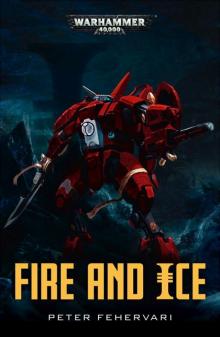 Fire and Ice - Peter Fehervari
Fire and Ice - Peter Fehervari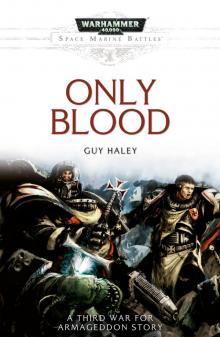 Only Blood - Guy Haley
Only Blood - Guy Haley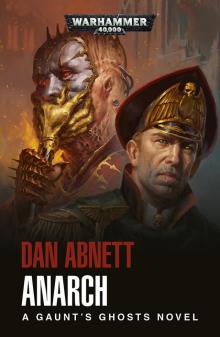 Anarch - Dan Abnett
Anarch - Dan Abnett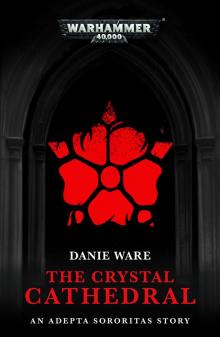 The Crystal Cathedral - Danie Ware
The Crystal Cathedral - Danie Ware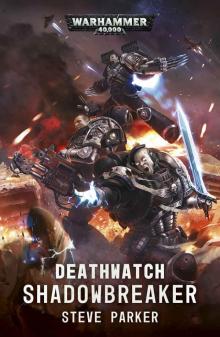 Shadowbreaker
Shadowbreaker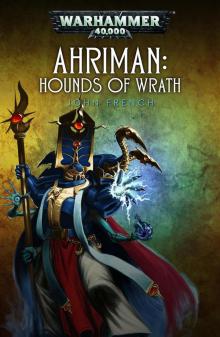 Hounds of Wrath - John French
Hounds of Wrath - John French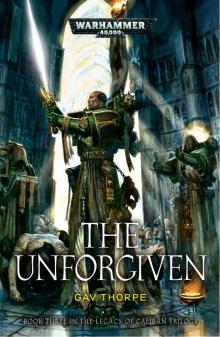 The Unforgiven - Gav Thorpe
The Unforgiven - Gav Thorpe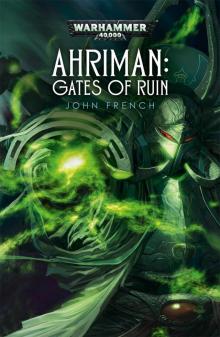 Gates of Ruin - John French
Gates of Ruin - John French Celestine - Andy Clark
Celestine - Andy Clark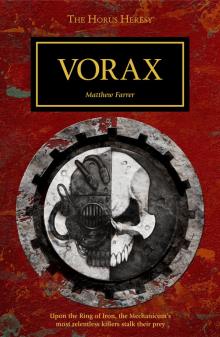 Vorax - Matthew Farrer
Vorax - Matthew Farrer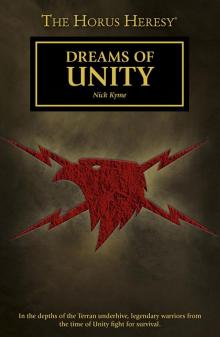 Dreams of Unity - Nick Kyme
Dreams of Unity - Nick Kyme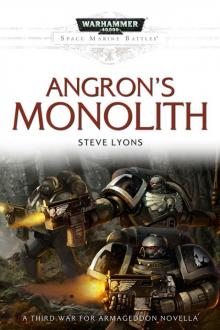 Angron's Monolith - Steve Lyons
Angron's Monolith - Steve Lyons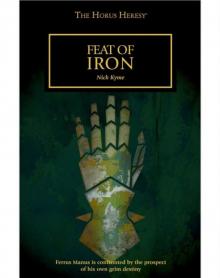 Feat of Iron - Nick Kyme
Feat of Iron - Nick Kyme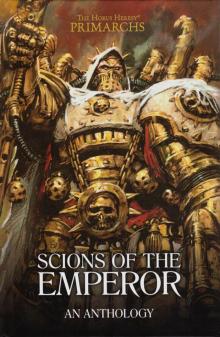 Scions of the Emperor
Scions of the Emperor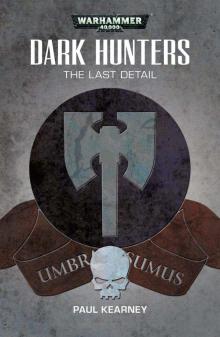 The Last Detail - Paul Kearney
The Last Detail - Paul Kearney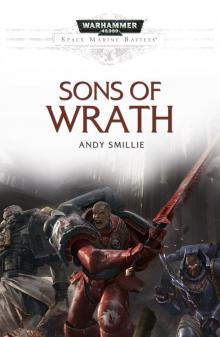 Sons of Wrath - Andy Smillie
Sons of Wrath - Andy Smillie Repentia - Alec Worley
Repentia - Alec Worley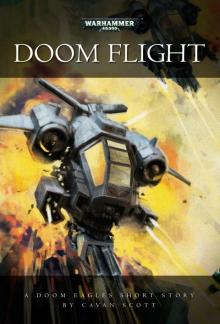 Doom Flight - Cavan Scott
Doom Flight - Cavan Scott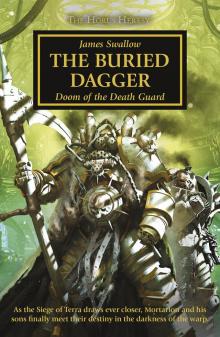 The Buried Dagger - James Swallow
The Buried Dagger - James Swallow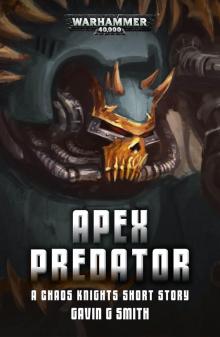 Apex Predator - Gavin G Smith
Apex Predator - Gavin G Smith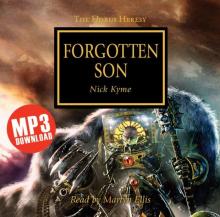 Forgotten Sons - Nick Kyme
Forgotten Sons - Nick Kyme Honourbound - Rachel Harrison
Honourbound - Rachel Harrison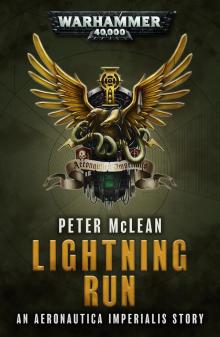 Lightning Run - Peter McLean
Lightning Run - Peter McLean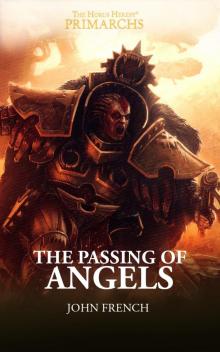 The Passing of Angels - John French
The Passing of Angels - John French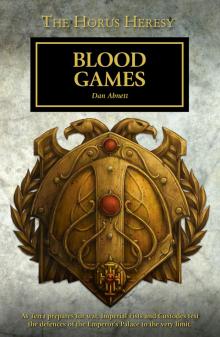 Blood Games - Dan Abnett
Blood Games - Dan Abnett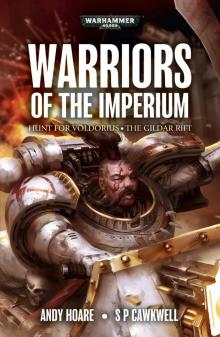 Warriors of the Imperium - Andy Hoare & S P Cawkwell
Warriors of the Imperium - Andy Hoare & S P Cawkwell Warcry
Warcry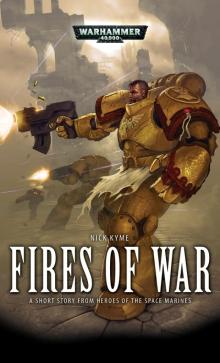 Fires of War - Nick Kyme
Fires of War - Nick Kyme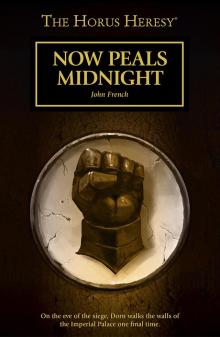 Now Peals Midnight - John French
Now Peals Midnight - John French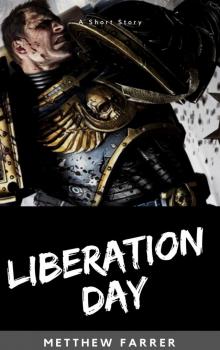 Liberation Day - Matthew Farrer
Liberation Day - Matthew Farrer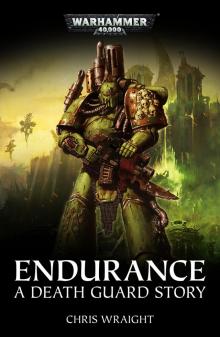 Endurance - Chris Wraight
Endurance - Chris Wraight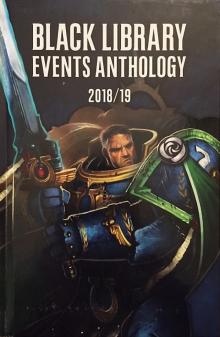 Black Library Events Anthology 2018-19
Black Library Events Anthology 2018-19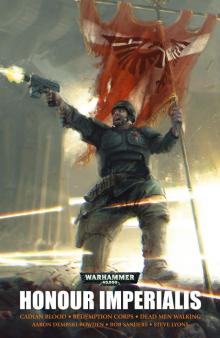 Honour Imperialis - Braden Campbell & Aaron Dembski-Bowden & Chris Dows & Steve Lyons & Rob Sanders
Honour Imperialis - Braden Campbell & Aaron Dembski-Bowden & Chris Dows & Steve Lyons & Rob Sanders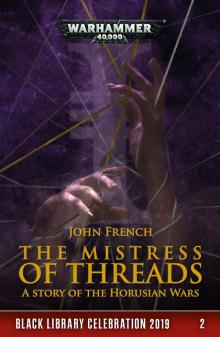 The Mistress of Threads - John French
The Mistress of Threads - John French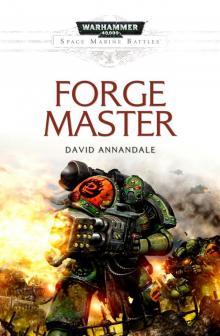 Forge Master - David Annandale
Forge Master - David Annandale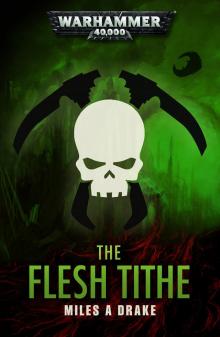 The Flesh Tithe - Miles A Drake
The Flesh Tithe - Miles A Drake Inferno Volume 2 - Guy Haley
Inferno Volume 2 - Guy Haley Mercy of the Dragon - Nick Kyme
Mercy of the Dragon - Nick Kyme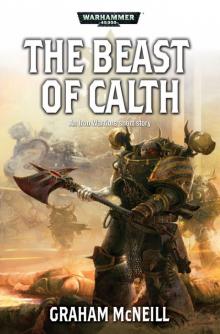 The Beast of Calth - Graham McNeill
The Beast of Calth - Graham McNeill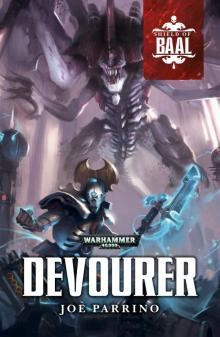 Devourer - Joe Parrino
Devourer - Joe Parrino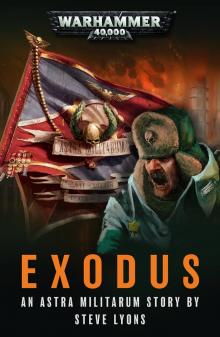 Exodus - Steve Lyons
Exodus - Steve Lyons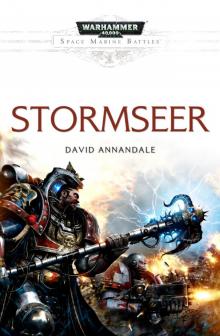 Stormseer - David Annandale
Stormseer - David Annandale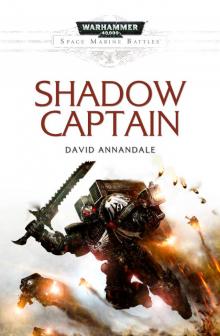 Shadow Captain - David Annandale
Shadow Captain - David Annandale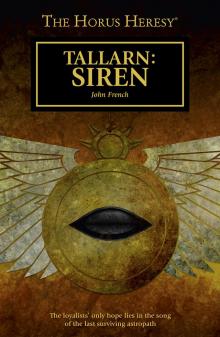 Tallarn- Siren - John French
Tallarn- Siren - John French The Grey Raven - Gav Thorpe
The Grey Raven - Gav Thorpe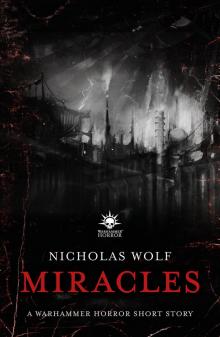 Miracles - Nicholas Wolf
Miracles - Nicholas Wolf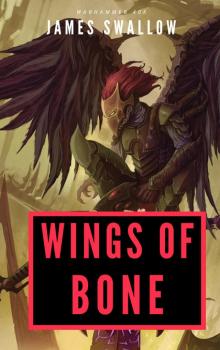 Wings of Bone - James Swallow
Wings of Bone - James Swallow